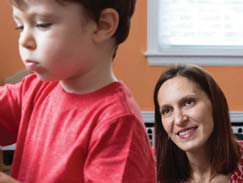Advice from Laura Brumariu, Ph.D., on raising a well-adjusted child.
 Few of us formally prepare for parenting. We read some books and heed advice, but for the most part we learn as we go—for better or worse.
Few of us formally prepare for parenting. We read some books and heed advice, but for the most part we learn as we go—for better or worse.
So, what is it like to raise a child when you have some legitimate expertise? We spoke to one such parent, Laura Brumariu, Ph.D., assistant professor in the Gordon F. Derner School of Psychology, to gain tips that might help the rest of us.
Dr. Brumariu has devoted much of her career to assessing the bonds that parents and caregivers form with children and how these affect children as they grow up. She has found that children who experience strong, loving bonds—or positive attachment—have an easier time making friends and managing their emotions. She knows from her studies and observations that being sensitive to a child’s needs is essential for both the child and the parent.
“When I study attachment, it shows the child seeking contact and proximity; because they don’t use words in the beginning, it’s all contact,” she said.
- Follow in their footsteps. It can be tempting in the age of Baby Mozart to
direct your child’s play. Don’t. If your child is crawling, crawl. Follow their lead and take direction when it comes to what to draw or how to act. - Keep it positive. Compliment your child on good behavior such as hugging
a friend or sharing a toy. Explain, in understandable language, why other behaviors, such as throwing a toy, are not allowed. - Distraction is your friend. If explaining doesn’t work, distract your child with a new toy or game.
- Let them DIY. If all else fails, take a step back and see whether your child can work things out on their own.
- Keep calm and carry on. Our children have the uncanny ability to evoke strong emotions in us—positive ones like love and joy, but also anger and frustration. Check those strong emotions when they become overwhelming.
- Share and share alike. In two-parent households, both should share in the chores and the joys of parenting. Dr. Brumariu said her husband is very involved, spending time with their son when she needs to work so she doesn’t become overwhelmed.
- Find balance. Dr. Brumariu describes parenting as a full-time job—one that she needs to balance with the high professional expectations she sets for herself. She admits that keeping her priorities balanced is her biggest challenge, but one that she is happy to have, as her teaching and research are also fulfilling and important.
- Don’t overanalyze. This can be tough for professional and armchair
psychologists alike. Try not to “enter into the assessment mode,”
she advises. - There’s no such thing as perfect. “We cannot define perfect parenting,” she said. “You have to accept that you’re doing your best and keep doing that.”
For further information, please contact:
Todd Wilson
Strategic Communications Director
p – 516.237.8634
e – twilson@adelphi.edu